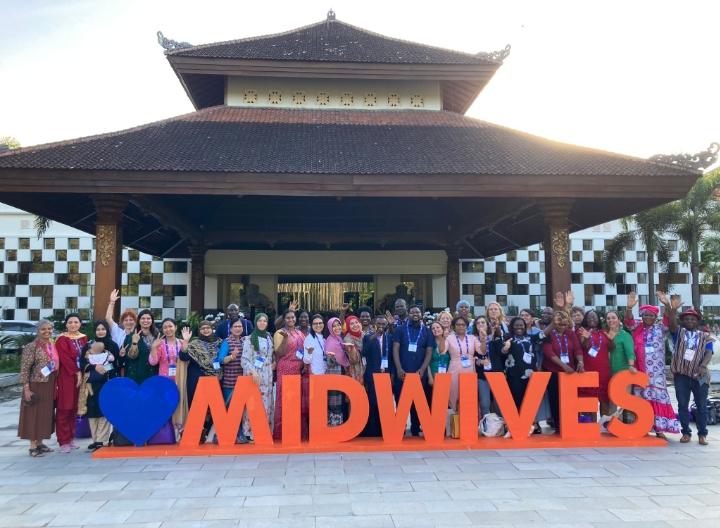
The world is currently undergoing the severe impact of climate change. In recent years, this has become one of the most significant global health concerns and chances are this is just the beginning. Moreover, the climate crisis is just part of the current planetary health (or as the UN likes to frame it, ‘triple planetary’) crisis. In more and more countries, meanwhile, the climate impact on women and babies’ health is increasing, through extreme weather conditions, including heatwaves, floods, fires and other natural phenomena. Against this rapidly deteriorating backdrop, on International Day of the Midwife (IDM) (5 May), we want to remind readers that midwives are absolutely vital for the health systems adaptation needed due to climate change. Among others, midwives can help advocate for carbon decimation and improve maternal and newborn health outcomes in times of crisis. But also more in general, they play a crucial role in addressing climate-related challenges.
Indeed, the International Confederation of Midwives (ICM) perceives midwives as a central part of the solution to the climate crisis. As this year’s ICM theme – Midwives: a vital climate solution – emphasizes, midwives’ contribution is indispensable in the battle against climate change. Midwives are a vital cornerstone when it comes to setting up, delivering, and supporting safe and ecologically sustainable health services. Midwives are also usually among the first ones to acknowledge and react to climate disaster.
Their role in ordinary times
The midwifery model of care is pro-environmental. This model is focused on personalized and continuous care to mothers and newborns resulting in healthy outcomes. The model creates less medical waste and is better for the environment due to a smaller ecological footprint. Moreover, midwives often deliver care in the community and at patients’ homes thus reducing the number of visits to the healthcare facilities. This helps to decrease the carbon footprint of healthcare.
Midwives in Indonesia are significant players in the delivery of community-based healthcare services especially in rural settings. For instance, the Yayasan KNCV Indonesia midwifery program is all about the integration of midwives into primary health care, thus allowing them to offer comprehensive maternal child health care across the continuum. Their services play a key role in reducing both travel and resource consumption.
Midwives also support mothers to achieve their breastfeeding goals, sustaining the health of the mother and infant while protecting the environment in the process. Ideally, breastfeeding is packaging-free and “produced” at home without the need for factories, while “transport” just takes place between the mother and baby. According to a 2016 Lancet paper, Why invest, and what it will take to improve breastfeeding practices?, breastfeeding provides short-term ànd long-term health and economic and environmental advantages to children, women, and society. The support midwives provide to young mothers to breastfeed, is one of the ways they work their magic in many settings around the world, including Indonesia.
Midwives act as champions of sexual and reproductive health, offering both education and safe contraception. If needed, they can also point to safe abortion care. Women’s empowerment to make informed choices about family planning empowers them to have fewer children; as a result, families are more economically resilient and less vulnerable to the effects of climate change. Midwives in Indonesia have contributed significantly to this effort, by helping reduce women’s deaths due to fertility.
First responders when disaster strikes
But as already mentioned above, midwives are also often the first responders during climate disasters. When climate disasters such as droughts, floods or fires hit communities, most health services and infrastructure are disrupted, often severely. As midwives form a considerable proportion of the health workforce and usually work closest to the affected community, they are among the first to reach and care for pregnant women and newborns when infrastructure and other health personnel services are less or no more available. When they reach the affected communities, midwives typically provide high-quality care, essential supplies and information supported by scientific evidence, thus ensuring continued maternal health services. For example, during the 2018 earthquake and following tsunami in Sulawesi, Indonesia, midwives were the first to reach the affected areas.
Time to involve midwives in decision making at all levels!
A call for more investment in, and empowerment of midwives in order to harness their full potential as a climate solution is thus more than warranted. Midwives’ participation should be increased at all levels of health care decision-making, from micro level decision making over national health system planning, all the way to global emergency preparedness and response planning – among others to help build more resilient ‘climate proof’ healthcare facilities. Their expertise and experience should be recognized and capitalized upon.
In sum, midwives are a vital climate solution, not only by promoting optimal maternal and child health outcomes in ordinary ànd crisis times, but also by contributing to environmental sustainability. Their work supports healthier communities and a healthier planet. As we celebrate the International Day of the Midwife, let us recognize and support the invaluable contribution of midwives. By investing in and empowering midwives all around the globe, we can work towards a more sustainable and equitable future for all.